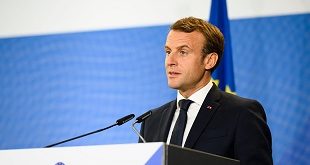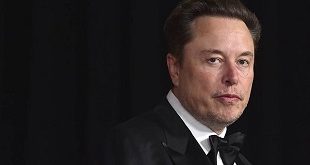
Paris, France | Xinhua | France, which is holding the rotating presidency of the Council of the European Union, and its ally Germany have been engaged in shuttle diplomacy, trying to de-escalate the Ukraine crisis.
Following his visits to Moscow and Kiev on Monday and Tuesday, French President Emmanuel Macron met with German Chancellor Olaf Scholz on Tuesday in Berlin. In a joint press conference, the French president reaffirmed that pursuing dialogues with Russia is “the only path that will make peace possible in Ukraine.”
Scholz, who played a “bad cop” in his U.S. visit on Monday and threatened a “united and decisive” response to Russia if Ukraine is invaded, also emphasized “the maintenance of peace must intervene through diplomacy.”
Ukraine-Russia relations have been deteriorating recently, with both sides massing large numbers of military personnel and equipment along their borders.
SHUTTLING MEDIATORS
Speaking to the European Parliament in January, Macron noted that France, together with Germany, would continue to seek a political solution to the Ukraine conflict within the Normandy format, which was set up in 2014 and gathered France, Germany, Russia and Ukraine to broker a peaceful solution.
On Monday, Macron held an hours-long discussion with Russian President Vladimir Putin over the Ukraine crisis.
After their talks, Putin said that Russia’s core concerns on security were ignored by the United States and the North Atlantic Treaty Organization (NATO), as the military alliance attempted to lecture Russia on where and how to place its armed forces.
Putin reiterated Russia’s opposition to NATO’s eastward expansion, though deeming some of Macron’s proposals on security “realistic.”
For his part, Macron told French press that his Russian counterpart assured him of “his desire to maintain the stability and territorial integrity of Ukraine.”
After his talks with Ukrainian President Volodymyr Zelensky in Kiev on Tuesday, Macron told a joint press conference that France will continue to work with Germany to mediate in the crisis.
Macron said that Zelensky had expressed his willingness to implement the Minsk agreements reached in 2014 and 2015, which envisaged a ceasefire, a withdrawal of heavy weaponry from the demarcation line, a prisoner exchange and local elections, among other measures.
On Monday, Scholz visited the United States for the first time as German chancellor, and discussed with U.S. President Joe Biden over the same topic.
In a press conference, Scholz proposed a dual-track approach to the Ukraine tensions, namely, to “intensively work on preparing possible sanctions together” while using “all diplomatic means.” He also plans to visit Kiev and Moscow a week after Macron’s tour.
NATO’S ENLARGEMENT A MISTAKE
After meeting with Putin, Macron said that the trip allowed to “avoid any further escalation, to open new perspectives, to trigger a new dynamic,” French newspaper Le Figaro reported.
But as talks were going on, none of the parties — Russia, Ukraine, France, Germany, the United States and NATO — has compromised on the key issue: the future possible membership of Ukraine in NATO.
Speaking to Le Figaro, Jean-Marie Guehenno, former UN under-secretary-general for peacekeeping operations, described NATO’s non-stop enlargement as a mistake.
The alliance’s promise in 2008 to include Ukraine and Georgia one day was “the worst compromise” that has worried Russia, he said. “It was hypocritical to claim that NATO enlargement was compatible with the development of real friendship with Russia.”
Meanwhile, the United States is also mulling military and economic plans in response to Russia’s possible invasion of Ukraine, while both its allies and foes, as the U.S. News reported, are “casting doubt on the latest White House attempts at deterrence.”
Last week, the Pentagon decided to deploy more troops to Europe, including 1,000 troops based in Germany to be repositioned to Romania and another 2,000 to be sent from the United States to Germany and Poland. It has already put some 8,500 troops on “heightened alert,” in preparation for what it claimed to be an “imminent” Russian invasion of Ukraine.
Economically, Biden has also threatened to “bring an end” to the Nord Stream 2 gas pipeline project, which is crucial for Europe’s future gas supply, and will definitely have a spillover effect on Europe.
Elwin de Groot, head of macro strategy at Dutch banking company Rabobank, has warned that the geopolitical tensions over Ukraine “are already affecting the eurozone economy, because of the high gas and energy prices.”
*****
Xinhua
 The Independent Uganda: You get the Truth we Pay the Price
The Independent Uganda: You get the Truth we Pay the Price


